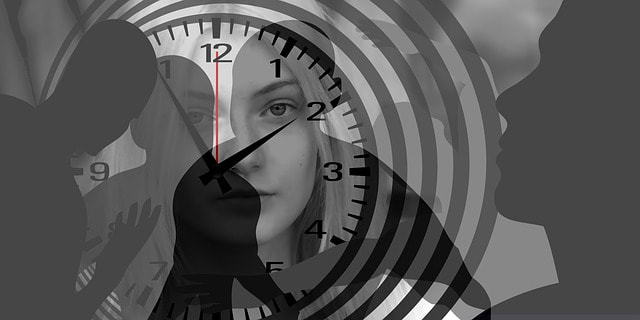According to CBN Health Reporter Lorie Johnson, "The apostle Paul wrote, "What I want to do, I do not do. But what I hate, I do." Many of us feel that way at times. Does it seem as if you are a slave to your bad habits? If so, you're not alone.
A Duke University study shows nearly half of everything we do each day is not a conscious decision, but instead, just a habit!
But take heart, a new technique is now available to help us take back control of our behavior.
A Habit in Three Parts
Scientists recently uncovered an enormous amount about how habits work in our brains. New York Times journalist Charles Duhigg compiled this information in his book, The Power of Habit.
"Everything we know about the science of habits indicates any habit can be changed," he said.
In The Power of Habit, Duhigg points out each habit contains three parts:
"And that's how you can change habits: by diagnosing and paying attention to these cues and rewards," he said.
Battling a Sweet Tooth
Duhigg used himself as an example. In his job at the New York Times , he wanted to break his bad habit of eating a cookie in the company cafeteria every afternoon. That was the routine. He needed to figure out the cue and the reward, though.
He did some experimenting over a few days to determine the cue, knowing that a cue is always one of five things: a time of day, a certain place, the presence of other people, a particular emotion or something you just did.
"And so every day when I had a cookie urge, I'd write down those five things," he explained, "You know, where am I sitting, what am I doing. And I realized pretty soon that the cue was a certain time of day. It always hit between 3:15 and 3:45."
Then he experimented to diagnose the reward. Did it satisfy hunger? No, because after eating a filling apple, he still craved a cookie. Was it getting a break from work? No, because after walking outside, he still craved a cookie. How about interacting with other people? Bingo. Because when he socialized, even without food, he felt content.
"The cookie had become an excuse for talking to other people," he deduced. "So once I recognized that, that the cue was a certain time of day and the reward was the social experience, I could re-shape the behavior, the routine."
"So now every day I stand up at 3:30 and I look for someone to go have a conversation with, and I walk over to their desk, and then I go back to my desk, and the cookie urge is totally gone. I've changed that habit," he said.
Let's say you want to break your bad habit of smoking a cigarette every night. That's the routine. The first thing you need to do is figure out the cue. Let's say you figure out it's finishing dinner. Now you need to figure out the reward, let's say to determine the reward is a feeling of relaxation. Now what you need to do is come up with a better routine that delivers the same reward, such as taking a bath.
Why the Reward is Crucial
But what if, instead of changing a habit, you'd like to start a brand new one... for example daily exercise?
A Duke University study shows nearly half of everything we do each day is not a conscious decision, but instead, just a habit!
But take heart, a new technique is now available to help us take back control of our behavior.
A Habit in Three Parts
Scientists recently uncovered an enormous amount about how habits work in our brains. New York Times journalist Charles Duhigg compiled this information in his book, The Power of Habit.
"Everything we know about the science of habits indicates any habit can be changed," he said.
In The Power of Habit, Duhigg points out each habit contains three parts:
- First is a cue, which automatically triggers us to start
- Then comes the routine, which is the behavior itself
- Last is the reward, which is what we crave, and is the key to our brain remembering that routine in the future
"And that's how you can change habits: by diagnosing and paying attention to these cues and rewards," he said.
Battling a Sweet Tooth
Duhigg used himself as an example. In his job at the New York Times , he wanted to break his bad habit of eating a cookie in the company cafeteria every afternoon. That was the routine. He needed to figure out the cue and the reward, though.
He did some experimenting over a few days to determine the cue, knowing that a cue is always one of five things: a time of day, a certain place, the presence of other people, a particular emotion or something you just did.
"And so every day when I had a cookie urge, I'd write down those five things," he explained, "You know, where am I sitting, what am I doing. And I realized pretty soon that the cue was a certain time of day. It always hit between 3:15 and 3:45."
Then he experimented to diagnose the reward. Did it satisfy hunger? No, because after eating a filling apple, he still craved a cookie. Was it getting a break from work? No, because after walking outside, he still craved a cookie. How about interacting with other people? Bingo. Because when he socialized, even without food, he felt content.
"The cookie had become an excuse for talking to other people," he deduced. "So once I recognized that, that the cue was a certain time of day and the reward was the social experience, I could re-shape the behavior, the routine."
"So now every day I stand up at 3:30 and I look for someone to go have a conversation with, and I walk over to their desk, and then I go back to my desk, and the cookie urge is totally gone. I've changed that habit," he said.
Let's say you want to break your bad habit of smoking a cigarette every night. That's the routine. The first thing you need to do is figure out the cue. Let's say you figure out it's finishing dinner. Now you need to figure out the reward, let's say to determine the reward is a feeling of relaxation. Now what you need to do is come up with a better routine that delivers the same reward, such as taking a bath.
Why the Reward is Crucial
But what if, instead of changing a habit, you'd like to start a brand new one... for example daily exercise?
In this case, you have to come up with your own cue and reward. But make sure the reward is something you genuinely enjoy, like listening to your favorite music."
Duhigg explains why choosing the right reward is so important.
"If you go for a run every morning and you tell yourself, 'I'm going to reward myself by eating kale chips, that is not going to work because nobody actually likes kale chips, right?" he laughed.
"On the other hand," he continued, "there was a study that was done in Germany where they told people, go running every morning, and when you are finished, eat a small piece of chocolate. And it worked! Because chocolate is a reward that people actually enjoy."
So by understanding our habits are simply cues, followed by a routine, then a reward, we can control our behavior.
Keep in mind that habits become easier with time until they eventually become automatic, requiring no thought whatsoever. Also, if you commit to a habit and then break it, it will be easier to resume than when you first started it.
Keystone Habits
There are certain habits, called "Keystone Habits," which is a habit that matters more than others. Keystone Habits seem to set off a chain-reaction of other habits.
An example of this is daily exercise. A lot of people, when they start to exercise habitually, without even thinking about it, start eating better.
They also stop using their credit cards as much, they procrastinate 20 minutes less per day, and they do their dishes sooner.
The theory behind Keystone Habits is that when you experience success in an area that has a deep emotional value to you, then your self-esteem grows and you believe you can do more, so you so. In other words, you see yourself as a "winner" and you start behaving that way.
Also, willpower is like a muscle. The more you use it the stronger it becomes. So the more you exercise self-control, the more you can handle, and the easier it will become."
By working with the Holy Spirit to overcome bad habits, we remove yet another obstacle to discovering, unlocking and living our destiny.
*Always seek the advice of your physician or other qualified healthcare provider before starting any new treatment or discontinuing an existing treatment. Talk with your healthcare provider about any questions you may have regarding a medical condition.
Duhigg explains why choosing the right reward is so important.
"If you go for a run every morning and you tell yourself, 'I'm going to reward myself by eating kale chips, that is not going to work because nobody actually likes kale chips, right?" he laughed.
"On the other hand," he continued, "there was a study that was done in Germany where they told people, go running every morning, and when you are finished, eat a small piece of chocolate. And it worked! Because chocolate is a reward that people actually enjoy."
So by understanding our habits are simply cues, followed by a routine, then a reward, we can control our behavior.
Keep in mind that habits become easier with time until they eventually become automatic, requiring no thought whatsoever. Also, if you commit to a habit and then break it, it will be easier to resume than when you first started it.
Keystone Habits
There are certain habits, called "Keystone Habits," which is a habit that matters more than others. Keystone Habits seem to set off a chain-reaction of other habits.
An example of this is daily exercise. A lot of people, when they start to exercise habitually, without even thinking about it, start eating better.
They also stop using their credit cards as much, they procrastinate 20 minutes less per day, and they do their dishes sooner.
The theory behind Keystone Habits is that when you experience success in an area that has a deep emotional value to you, then your self-esteem grows and you believe you can do more, so you so. In other words, you see yourself as a "winner" and you start behaving that way.
Also, willpower is like a muscle. The more you use it the stronger it becomes. So the more you exercise self-control, the more you can handle, and the easier it will become."
By working with the Holy Spirit to overcome bad habits, we remove yet another obstacle to discovering, unlocking and living our destiny.
*Always seek the advice of your physician or other qualified healthcare provider before starting any new treatment or discontinuing an existing treatment. Talk with your healthcare provider about any questions you may have regarding a medical condition.


 RSS Feed
RSS Feed